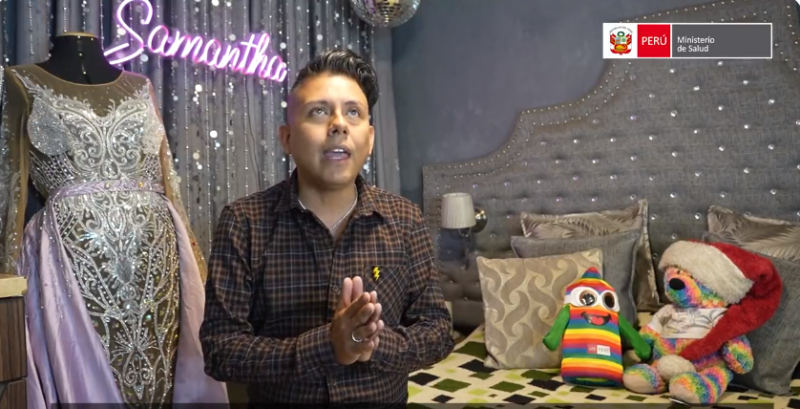"My name is Jonathan. Today I'm not going to tell you how I got monkeypox, but how complicated it is to carry this disease", says the activist and crossdresser Jonathan Albinagorta. He is also known as Samantha Braxton, one of the influencers supporting the Ministry of Health in its video campaigning on monkeypox prevention in Peru.
With more than 2300 confirmed cases of Monkeypox by the end of September, Peru had the world's highest infection rate per million people, according to Our World in Data, a collaborative online platform led by researchers at the University of Oxford.
The response to the outbreak in Peru was set up under the leadership of the national HIV strategy team, which developed a plan to raise awareness of the disease. Its public real-time data dashboard, inspired by the COVID-19 response, provided concrete evidence for the rapid of an awareness campaign. However, the same data, mainly from HIV-specialized centres, also had the unwelcome side-effect of increasing stigma and discrimination for some groups of people.
"The data created a biased sample at the beginning. Evidence showed that people living with HIV and some key populations, such as gay men, were among the most affected in Peru", recalls Andrea Boccardi, UNAIDS director for Peru, Bolivia, Ecuador and Colombia. "But these are the very people who have the culture of going to the HIV-friendly services for consultations, for periodical examinations and HIV treatment."
Referral Centers for Sexually Transmitted Infections, known as Cerits, and Periodic Health Care Units provide HIV services for Peru's most vulnerable and key populations. "These groups of people do not go to hospitals where they tend to suffer discrimination. They go to these centres, where the greatest number of monkeypox diagnoses came from at first", explains Boccardi.
Experience in dealing with the HIV pandemic shows that data must be accompanied by adequate information-sharing to the public and impacted groups in a non-stigmatizing way. An inclusive approach and the correct use of language are key to engage with communities so that they become an integral part of the response instead of being driven away.
UNAIDS supported the country in quickly setting up a strategy that included meetings between health officials and civil society representatives. Community leaders also contributed by reviewing messages coming out of the ministry of health. People also received training to act as spokespeople in media interviews.
“Often, the communication from the ministry of health ends up being very institutional or quite distant. Something that the community cannot fully digest”, says Mauricio Guitierrez, a GayLatino network activist. “We elaborated friendly visual materials for dissemination. It is important to translate and personalize the information for people and that was what we tried to do by supporting the ministry in these campaigns.”
”As well as informing and clinically diagnosing the most at-risk populations in saunas, hotels, and other sites, monkeypox working group convinced mayors to keep these establishments open and to use them as critical platforms for the dissemination of relevant information on monkeypox directing people to the information and services made available.”
In Peru, LGBTIQ+ people and people living with HIV are the most discriminated against, with 71% and 70% of them, respectively, reporting to have suffered discrimination at some level, according to the National Human Rights Survey released in 2021 by the Ministry of Justice and Ipsos Peru.
“Out of fear of stigma and of what people will say, a lot of us don’t ask and fall into the same trap of ignorance”, says Albinagorta. “It was great that the Ministry placed QR codes in LGBT establishments, for example.”
Alliances with telecom companies and social networking apps, such as Grindr, created opportunities to inform the most vulnerable populations through an estimated 40 million messages focused on monkeypox prevention and treatment. Former COVID-19 spaces were also used for the 21-day isolation period for people not able to comply with thisrequirement, including migrants and refugees.
Despite some early signs of stabilization, the Pan American Health Organization (PAHO) said recently that it is too early to proclaim victory. It called on countries "to intensify the response actions, prioritizing detection, surveillance and community engagement to reduce new cases and put an end to the outbreak in the region." The United States still accounts for more than half of cases, but rapid increases have been witnessed in Brazil, Peru, Colombia, Mexico and Chile in the past month.
The Ministry of Health of Peru is purchasing vaccines through the PAHO Strategic Fund, but the total number of vaccines available for the entire region is 100 000. The main challenges are the criteria for prioritization as the expected number of vaccines per country will be no more of 5000.
"Many people contacted me after my first video for the ministry of health in Peru. For those who are suspicious, it inspires more confidence to approach someone like me, who has had monkeypox and talks freely about it, than to go to a hospital, an institution or the ministry itself, " says Samantha. "Of course, there are also haters. Some people believe that when a gay man shares that he has had monkeypox, he is stigmatizing himself. But that's not it.”






